32 Forms of Vinayagar & its Meaning

Lord Ganesha - The Remover of Obstacles
Lord Ganesha or Vinayagar is the first son of Lord Shiva and Goddess Parvati. Vinayagar, also known as Vighneswaran—meaning the Remover of Obstacles—is widely celebrated as the God who brings good beginnings and fortune. As such, Vinayagar is worshipped at the beginning of any effort, business or celebration.32 Forms in Ganesha Purana
According to Ganesha Purana, Vinayagar is described in 32 different forms or manifestations, however, Maha Ganapati is the most commonly worshipped form. And let us take a look at the 32 forms of Vinayagar.1. Bala Ganapati
 As the name suggests, Bala Ganapati is the child form of Vinayagar that symbolises earth's abundance and fertility as he holds a banana, mango, sugarcane, and jackfruit in each of His four hands. His trunk curls around His favourite sweet 'Modakam'.
As the name suggests, Bala Ganapati is the child form of Vinayagar that symbolises earth's abundance and fertility as he holds a banana, mango, sugarcane, and jackfruit in each of His four hands. His trunk curls around His favourite sweet 'Modakam'.
2. Taruna Ganapati
 Taruna Ganapati is in His teens and symbolises youthfulness (His body glows in red). In this form, Vinayagar has 8 arms, each holding a modakam, noose, goad, wood apple, rose apple, tusk, some paddy, and sugar cane.
Taruna Ganapati is in His teens and symbolises youthfulness (His body glows in red). In this form, Vinayagar has 8 arms, each holding a modakam, noose, goad, wood apple, rose apple, tusk, some paddy, and sugar cane.3. Bhakti Ganapati
 As Bhakti Ganapati, Vinayagar holds a banana, a mango, coconut and a bowl of sweet payasam pudding in each of His four arms. The divine sight of this form shines like a full moon and usually worshipped by farmers during harvest season.
As Bhakti Ganapati, Vinayagar holds a banana, a mango, coconut and a bowl of sweet payasam pudding in each of His four arms. The divine sight of this form shines like a full moon and usually worshipped by farmers during harvest season.4. Vira Ganapati
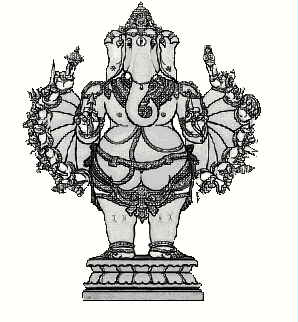
Vira Ganapati is a 16-armed warrior holding weapons in His arms—signifying Vinayagar's triumph over evil and ignorance.
5. Shakti Ganapati
 In this form, Vinayagar is a protector as one of His 'shaktis' is seated on His lap. On the other hand, Shakti Ganapati holds an 'Abhaya mudra', bestowing blessings to all His devotees.
In this form, Vinayagar is a protector as one of His 'shaktis' is seated on His lap. On the other hand, Shakti Ganapati holds an 'Abhaya mudra', bestowing blessings to all His devotees.6. Dvija Ganapati
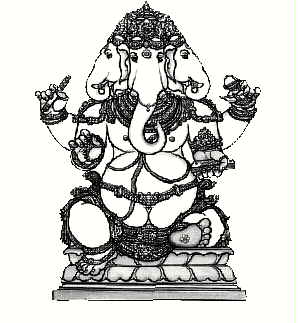
This four-headed Dvija Ganapati is worshipped for wealth and knowledge. 'Dvija' means twice born. In this form, Vinayagar holds a ‘Kamandalu’, Rudraksha, a staff, and a leaf scripture.
7. Siddhi Ganapati
 Glowing in golden yellow, Siddhi Ganapati is the master of intellect and success. Sitting in a relaxed position, this form of Vinayagar holds a bouquet of flowers, an axe, mango, sugar cane and, in His trunk, a modakam.
Glowing in golden yellow, Siddhi Ganapati is the master of intellect and success. Sitting in a relaxed position, this form of Vinayagar holds a bouquet of flowers, an axe, mango, sugar cane and, in His trunk, a modakam.8. Ucchhishta Ganapati
 Ucchhishta Ganapati is called the 'Lord of Blessed Offerings' and is the guardian of culture. 'Shakti' of creativity sits on His laps and His hands carry the veena, a blue lotus, pomegranate, meditation beads and a stalk of paddy.
Ucchhishta Ganapati is called the 'Lord of Blessed Offerings' and is the guardian of culture. 'Shakti' of creativity sits on His laps and His hands carry the veena, a blue lotus, pomegranate, meditation beads and a stalk of paddy.9. Vighna Ganapati
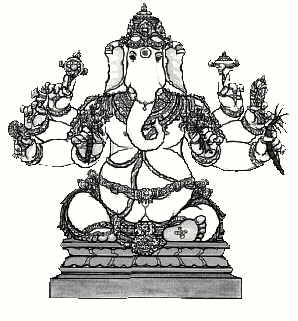
Vighna Ganapati means remover of obstacles. Just like Lord Vishnu, this eight-armed form of Vinayagar has a Shankhu and Chakra in two of His hands. In others, He holds a noose, goad, tusk, modakam, a bouquet of flowers, sugar cane, flower arrow, and an axe.
10. Kshipra Ganapati
 It is believed that Kshipra Ganapati is the giver of boons. In this form, Vinayagar is known to fulfill His devotees' wishes quickly. He carries a noose, goad and a sprig of the kalpavriksha (wish-fulfilling) tree. A pot of jewels is seen curled up in His trunk.
It is believed that Kshipra Ganapati is the giver of boons. In this form, Vinayagar is known to fulfill His devotees' wishes quickly. He carries a noose, goad and a sprig of the kalpavriksha (wish-fulfilling) tree. A pot of jewels is seen curled up in His trunk.11. Heramba Ganapati
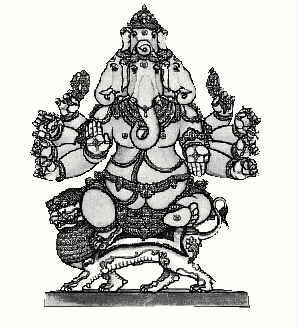
Vinayagar is a five-faced protector who rides a lion in this form called Heramba Ganapati. He carries an axe, hammer, noose, beads, broken tusk, garland, fruit and modakam in eight of His ten hands.
12. Lakshmi Ganapati
 His shaktis Buddhi and Siddhi seated on Vinayagar's laps in this form is actually wisdom and achievement. Two of His hands gesture the Varadha and Abhaya Mudras, while other hands bear a green Parrot, a Pomegranate, a sword, a noose, elephant goad, sprig of Kalpavriksha (Wish-fulfilling tree) and water vessel. Both His shaktis hold white lotus flowers.
His shaktis Buddhi and Siddhi seated on Vinayagar's laps in this form is actually wisdom and achievement. Two of His hands gesture the Varadha and Abhaya Mudras, while other hands bear a green Parrot, a Pomegranate, a sword, a noose, elephant goad, sprig of Kalpavriksha (Wish-fulfilling tree) and water vessel. Both His shaktis hold white lotus flowers.13. Maha Ganapati
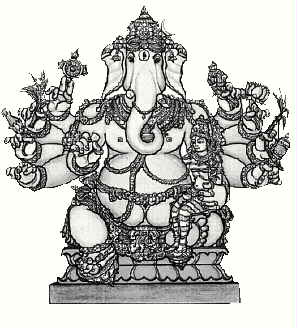
The most commonly-worshipped form of Vinayagar. It is believed that the worshippers of Maha Ganapati will gain intellect, prosperity and protection from evil. Seated together with one of His shaktis, Maha Ganapati holds His broken tusk, blue lily, lotus, a pomegranate, a stalk of sugarcane, sprig of paddy and weapons.
14. Vijaya Ganapati
 Vijayam means victory. Sitting on top of Mooshika (His vehicle mouse), Vijaya Ganapati is the destroyer of dark forces. His four arms carry a broken tusk, noose, goad, and a ripe mango.
Vijayam means victory. Sitting on top of Mooshika (His vehicle mouse), Vijaya Ganapati is the destroyer of dark forces. His four arms carry a broken tusk, noose, goad, and a ripe mango.15. Nritya Ganapati
 With a golden glow, Nritya Ganapati is the Dancer—joyfully vibrant! Dancing under the kalpavriksha (wish-fulfilling) tree, he wears rings on His fingers while the four arms bear the tusk, noose, goad, and modakam.
With a golden glow, Nritya Ganapati is the Dancer—joyfully vibrant! Dancing under the kalpavriksha (wish-fulfilling) tree, he wears rings on His fingers while the four arms bear the tusk, noose, goad, and modakam.16. Urdhva Ganapati
 Urdhava Ganapati is the 'elevated one' who's sitting in a tantric position with His shakti. Each of His six hands bears a lotus, paddy, sugarcane, an arrow, broken tusk, and blue lily.
Urdhava Ganapati is the 'elevated one' who's sitting in a tantric position with His shakti. Each of His six hands bears a lotus, paddy, sugarcane, an arrow, broken tusk, and blue lily.17. Ekakshara Ganapati
 Sitting on His divine vehicle Mooshika in the Padmashana pose, Ekakshara Ganapati is a four-armed and three-eyed form of Vinayagar. He holds a noose, goad and a pomegranate in His hands.
Sitting on His divine vehicle Mooshika in the Padmashana pose, Ekakshara Ganapati is a four-armed and three-eyed form of Vinayagar. He holds a noose, goad and a pomegranate in His hands.18. Varada Ganapati
 Varada Ganapati fulfills His devotees' wishes. Just like His father Lord Shiva, Varada Ganapati has the third eye of wisdom and a crescent moon over His head. He also bears a noose, goad, dish of honey in His hands and a pot of jewels in His trunk.
Varada Ganapati fulfills His devotees' wishes. Just like His father Lord Shiva, Varada Ganapati has the third eye of wisdom and a crescent moon over His head. He also bears a noose, goad, dish of honey in His hands and a pot of jewels in His trunk. 19. Tryakshara Ganapati
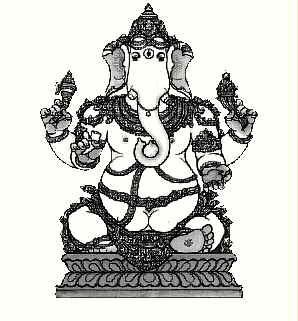
Tryakshara Ganapati is the Lord of A-U-M. He carries the broken tusk, goad, noose and mango in His hands and a modakam in His trunk.
20. Kshipra Prasada Ganapati
 This form of Vinayagar rests on a Kusha grass throne. He fulfills His devotees' wishes quickly but punishes any wrongdoings even quicker. While His big belly symbolises the universe, while His arms bear a broken tusk, the twig of Kalpavriksha, noose, an elephant goad, pomegranate, and a white lotus.
This form of Vinayagar rests on a Kusha grass throne. He fulfills His devotees' wishes quickly but punishes any wrongdoings even quicker. While His big belly symbolises the universe, while His arms bear a broken tusk, the twig of Kalpavriksha, noose, an elephant goad, pomegranate, and a white lotus.21. Haridra Ganapati
 Seated on a royal throne, this calm-faced Haridra Ganapati clad in golden yellow vest and ornaments holds a broken tusk, modakam, noose and a goad in His hands.
Seated on a royal throne, this calm-faced Haridra Ganapati clad in golden yellow vest and ornaments holds a broken tusk, modakam, noose and a goad in His hands. 22. Ekadanta Ganapati
 Compared to the other forms, Ekadanta Ganapati has a bigger belly and is known for His broken tusk. His hands hold broken tusk, Ladu, japa beads mala, and an axe to cut the bond of ignorance.
Compared to the other forms, Ekadanta Ganapati has a bigger belly and is known for His broken tusk. His hands hold broken tusk, Ladu, japa beads mala, and an axe to cut the bond of ignorance.23. Srishti Ganapati
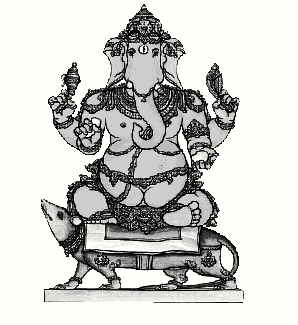
Srishti Ganapati is the happy form of Vinayagar. He holds a noose, a goad, a perfect mango, and His tusk, representing selfless sacrifice.
24. Uddanda Ganapati
 Uddanda Ganapati enforces justice. Accompanied by one of His shaktis, this is an angry form of Vinayagar. In His ten hands, he carries a pot of jewels, a blue lily, sugar cane, mace, lotus flower, a sprig of paddy, pomegranate, noose, garland, and His broken tusk.
Uddanda Ganapati enforces justice. Accompanied by one of His shaktis, this is an angry form of Vinayagar. In His ten hands, he carries a pot of jewels, a blue lily, sugar cane, mace, lotus flower, a sprig of paddy, pomegranate, noose, garland, and His broken tusk.25. Rinamochana Ganapati
 Rinamochana Ganapati frees His devotees from guilt and bondage by giving 'moksha'. He wields a noose, goad, rose apple and broken tusk in His four hands.
Rinamochana Ganapati frees His devotees from guilt and bondage by giving 'moksha'. He wields a noose, goad, rose apple and broken tusk in His four hands.26. Dhundhi Ganapati
 Dhundh means search. This is the form of Vinayar sought after by the devotees. He is the symbol of awakening. Dhundhi Ganapati holds a strand of rudraksha beads, His broken tusk, an axe, and a small pot of jewels.
Dhundh means search. This is the form of Vinayar sought after by the devotees. He is the symbol of awakening. Dhundhi Ganapati holds a strand of rudraksha beads, His broken tusk, an axe, and a small pot of jewels.27. Dvimukha Ganapati
 In this form, Vinayagar has two faces enabling Him to see in all directions. Dvimukha Ganapati's four arms hold the goad, noose, a pot of gems and His broken tusk symbolising self-sacrifice.
In this form, Vinayagar has two faces enabling Him to see in all directions. Dvimukha Ganapati's four arms hold the goad, noose, a pot of gems and His broken tusk symbolising self-sacrifice.
28. Trimukha Ganapati
 Just like His name, this form of Vinayagar is three-faced and bestows protection and blessings to His devotees. Resting on a golden lotus, this six-armed Trimukha Ganapati bears a noose, goad, beads and a pot of nectar.
Just like His name, this form of Vinayagar is three-faced and bestows protection and blessings to His devotees. Resting on a golden lotus, this six-armed Trimukha Ganapati bears a noose, goad, beads and a pot of nectar.29. Sinha Ganapati
 Sinha Ganapati is fearless as he rides and holds lions to signify strength and boldness. He also carries a kalpavriksha (wish-fulfilling tree) sprig, the vina, a lotus blossom, flower bouquet and a pot of jewels.
Sinha Ganapati is fearless as he rides and holds lions to signify strength and boldness. He also carries a kalpavriksha (wish-fulfilling tree) sprig, the vina, a lotus blossom, flower bouquet and a pot of jewels.30. Yoga Ganapati
 As the name suggests, Vinayagar resembles a yogi in this form. Glowing like the morning sun, Yoga Ganapati is seen meditating while His hands hold a stalk of sugar cane, a staff, prayer beads, and a noose.
As the name suggests, Vinayagar resembles a yogi in this form. Glowing like the morning sun, Yoga Ganapati is seen meditating while His hands hold a stalk of sugar cane, a staff, prayer beads, and a noose.31. Durga Ganapati
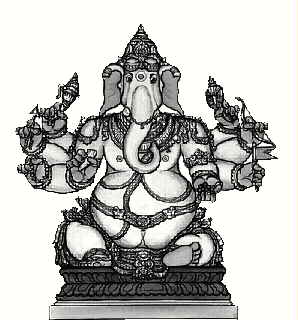
As Durga Ganapati, Vinayagar symbolises triumph over darkness. In this form, He bears a bow, arrow, noose, goad, prayer beads, broken tusk and a rose apple in His hands.
32. Sankatahara Ganapati
 Sankatahara Ganapati eliminates all sorts of sorrows and difficulties. As Vinayagar sits on a red lotus in this form, He carries noose, goad and a bowl of payasam in His hands. His right-hand shows Varadha mudra to bestow blessings to the devotees.
Sankatahara Ganapati eliminates all sorts of sorrows and difficulties. As Vinayagar sits on a red lotus in this form, He carries noose, goad and a bowl of payasam in His hands. His right-hand shows Varadha mudra to bestow blessings to the devotees.
J.KANNAN, M.Com, FIATA
WE BREATHE TO THINK"
No comments:
Post a Comment